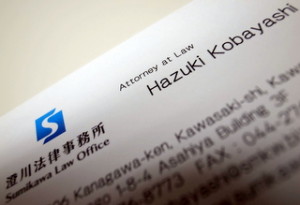We changed our email address for legal inquiries. When you have any inquiry, please send email to the address written below.
Author: Kei Sumikawa
Our new attorney
Child Support in Japan (Yoikuhi)
Updated the explanation about child support in Japan.
Our New Office (Kawasaki, Kanagawa)
Thank you for visiting our website.
We moved our law office on 1st November. Our new office is in a building near Kawasaki station. It is just 2 minutes walk from Keikyu Kawasaki station, and 5 minutes walk from JR Kawasaki station.
Kawasaki is next to Tokyo, and is near Haneda airport and Shinagawa immigration. We hope we can be of more help for foreigners living in Japan.
In addition, we will have another English speaking lawyer (“Bengoshi”) in December, so we will be able to offer more enhanced service to customers.
Our New Law Office in Kawasaki
 We are moving our office to a more spacious room on 1st November 2012.
We are moving our office to a more spacious room on 1st November 2012.
The new office is in Kawasaki-ku, Kawasaki city, and is nearby JR and Keikyu Kawasaki station.
We are planning to increase the number of our staff (including new attorney) so that we can continue to make quick and concrete reply to the increasing inquiries.



